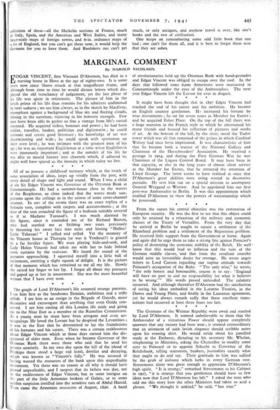It might have been thought that in 1897 Edgar Vincent
had reached the end of his career and his ambition. He became an English country gentleman. He increased his fortune by wise investments ; he sat for seven years as Member for Exeter ; and he acquired Esher Place. On the top of the hill there was a large mansion in the French style in which he entertained his many friends and housed his collection of pictures and works of art. At the bottom of the hill, by the river, stood the Tudor tower which was all that remained of the palace in which Cardinal Wolsey had once been imprisoned. It was characteristic of him that he became both a trustee of the National Gallery and Chairman of the Horsebreeders' Association. He received a peerage in 1914, and during the First German War he was Chairman of the Liquor Control Board. It may have been in that capacity, or else in the long years of almost silent service as the Member for Exeter, that he attracted the attention of Lloyd George. The latter seems to have realised at once that D'Abernon's great abilities were being wasted in decorative pursuits. He sent him out on a special mission to accompany General Weygand to Warsaw. And he appointed him our first post-war Ambassador to Berlin. It was this appointment which enabled D'Abernon to chow the powers of statesmanship which he possessed.






















 Previous page
Previous page